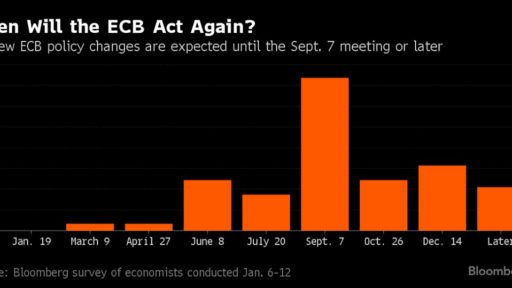- Home
- >
- Daily Accents
- >
- What can we expect from Mario Draghi’s speech?

What can we expect from Mario Draghi's speech?

As economists watch the European Central
Bank inject three-quarters of a trillion euros into the
financial system this year, they can while away the time by
looking out for a change in language from Mario Draghi.
The ECB president is likely to insist that quantitative
easing must continue to safeguard the euro area’s recovery when
he speaks after the Governing Council sets policy on Thursday.
But with an inflation pickup causing alarm in Germany, he may
also be asked when he might describe the risks to the price
outlook as “broadly balanced” -- a judgment he hasn’t made in
more than two years.
The Governing Council’s first policy decision of 2017 comes
six weeks after Draghi declared the threat of deflation to be
almost vanquished, and will probably mark the start of a year in
which the pressure continually mounts for officials to discuss
if and how stimulus should be withdrawn. In a sign that the mood
is gradually changing, Executive Board member Benoit Coeure
acknowledged last month that the balance of risks to inflation
is “shifting.”
The policy decision will be announced at 1:45 p.m.
Frankfurt time, and Draghi will speak to reporters 45 minutes
later. All economists surveyed by Bloomberg predict the central
bank will keep interest rates unchanged. Monthly asset purchases
should stay at 80 billion euros ($85 billion) until March and 60
billion euros from April to December.
Political Uncertainty
One of Draghi’s defenses is likely to be that the region
faces an unusual degree of uncertainty in 2017. Economies
including Germany, France and the Netherlands will hold
elections in which euro-skeptics might gain increased support,
and the U.K. is set to start formal talks on leaving the
European Union. A further risk comes from any protectionist
action by Donald Trump, who will be inaugurated as U.S.
president on Friday.
The ECB chief’s remarks will likely contrast with those by
his U.S. counterpart Janet Yellen. On Wednesday she said the
U.S. economy is “close” to the Federal Reserve’s objectives and
she’s confident it will continue to improve, warranting a
gradual reduction of monetary support.
Draghi and Yellen’s actions will feed into a wider debate
over whether central banks are being too cautious in normalizing
policy. That discussion surfaced again this week at the World
Economic Forum in Davos, Switzerland, where former Bank of
England Deputy Governor Paul Tucker warned against allowing
unelected monetary officials to intervene too much in the
economy.
“How central banks conduct themselves is of the utmost
importance now,” he said. “The people will not forgive us if
there’s another crisis.”
The headline inflation rate for the euro area last month
was the highest since 2013, and almost twice as high as in
November. German inflation jumped to an annual 1.7 percent,
sparking media outrage. Bundesbank President Jens Weidmann has
said the ECB should “tighten the reins” as soon as feasible, and
an account of the last policy meeting highlighted disagreements
over the proposal to extend QE.
Even so, the ECB remains well short of its goal of price
growth just under 2 percent, and has expressed concern that the
increase so far is largely due to oil. Core inflation picked up
only slightly to 0.9 percent and policy makers said last month
that they still see no convincing upward trend.
There is little sign that the Governing Council is ready to
endorse more hawkish language just yet. Austria’s Ewald Nowotny,
France’s Francois Villeroy de Galhau and Executive Board member
Yves Mersch have all indicated that they see worries about a
return of inflation as exaggerated.
“To me it’s clear that the ECB wanted to buy some time to
get out of the headlights for a while,” said Anatoli Annenkov,
an economist at Societe Generale SA in London. “But once we’re
past that policy uncertainty in the spring, I don’t see any
reason why we wouldn’t be discussing the pace of balance-sheet
expansion again by mid-year.”
 Varchev Traders
Varchev Traders Read more:
If you think, we can improve that section,
please comment. Your oppinion is imortant for us.











